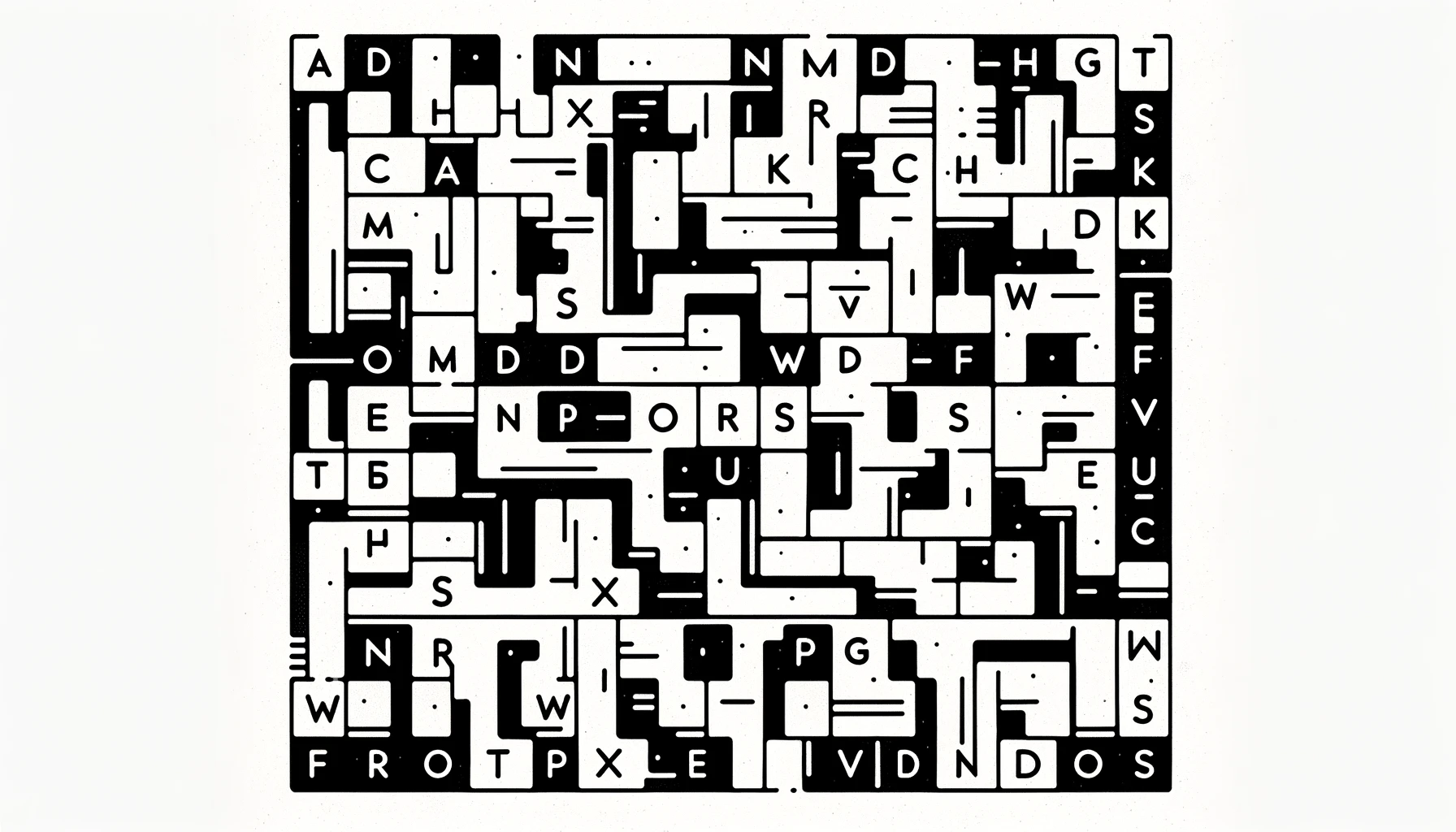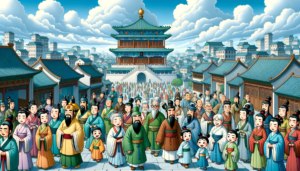Discover, Play, and Master
Word games are a testament to the power and playfulness of language. They span from the traditional paper-and-pencil games to the digital screens of modern technology. In this extended guide, we will explore the history, mechanics, and nuances of various word game genres, delve into recognizable examples like “Words with Friends,” and pinpoint what makes each game unique and special. Equip yourself with the rich backstory, strategies, and insider knowledge to not only play but to excel and find the perfect word game that resonates with your linguistic style.
<loc>https://word.tips/games/play-scramble-words/</loc>
</url>
<url>
<loc>https://word.tips/games/play-outspell/</loc>
</url>
<url>
<loc>https://word.tips/games/play-word-wipe/</loc>
</url>
<url>
<loc>https://word.tips/games/play-codeword/</loc>
</url>
<url>
<loc>https://word.tips/games/play-crossword-puzzles/</loc>
</url>
Crossword Puzzles: The Intersection of Knowledge and Logic
The venerable crossword puzzle has been a staple of newspapers and puzzle books for over a century. Crafted by Liverpool journalist Arthur Wynne in 1913, crosswords quickly became a global phenomenon, challenging solvers with grids of interlocking words based on cryptic clues.
Example Game: The New York Times Crossword — Renowned for its sophistication and the gradual difficulty that escalates throughout the week.
What Makes Crossword Puzzles Special: Crosswords provide a unique blend of general knowledge, linguistic prowess, and logic. They are not merely tests of vocabulary but windows to varied topics from history to pop culture, science to arts, making them endlessly engaging.
Scrabble: The Quintessential Word-Assembling Battle
Scrabble’s origin traces back to 1938 when architect Alfred Mosher Butts combined the elements of anagrams and crossword puzzles to create a game that would gain international acclaim. Players score by constructing words on a board, intersecting with others for maximum points.
Example Game: Words With Friends — A virtual take on Scrabble that allows players to challenge each other from any location via online connectivity.
What Makes Scrabble Special: Scrabble is a test of one’s knowledge of the lexicon and the ability to strategize; it’s about making the most of the tiles you draw and the spaces on the board, optimizing the use of ‘Triple Word Scores’ and ‘Double Letter Scores’ to outmaneuver your opponents.
Anagrams and Word Jumbles: Flexing the Mental Muscles
Anagrams and word jumbles lead you through a maze of scrambled letters. Popular since the 16th century, they require the solver to rearrange letters to form a word or sentence, typically associated with a theme or clue.
Example Game: TextTwist — A digital game where players make as many words as possible from a given set of letters within a time limit.
What Makes Anagrams Special: These puzzles stretch the cognitive flexibility and linguistic intuition of players. There is a certain allure to transforming a chaotic jumble into meaningful words, making it both a linguistic puzzle and a creative challenge.
Word Search Puzzles: The Joy of Pattern Recognition
Emerging as a leisure activity in the 1960s, word search puzzles consist of a grid filled with letters among which words are hidden horizontally, vertically, diagonally, and even sometimes backward.
Example Game: Boggle — A timed word search game where players find words in sequences of adjacent letters within a constrained timeframe.
What Makes Word Search Puzzles Special: Word searches offer a different pacing compared to other word games. They rely on the visual acumen and the ability to spot patterns amidst chaos, serving as an exceptional tool to relax and improve spelling.
Palindromes: Symmetry in Language
Palindromes stretch back to ancient times and can be found in Greek and Latin writings. A palindrome is a word, phrase, number, or other sequences of characters that reads the same forward and backward.
Example Game: None, but palindromes often appear as special challenges in various language-related games and competitions.
What Makes Palindromes Special: They intrigue with their symmetric property and often bring a whimsical charm to word games. Their incorporation can add an extra layer of creativity and fun to any linguistic challenge.
Spelling Bees: Celebrate the Precision of Language
Historic accounts of spelling bee contests date back to the 18th century. They epitomize the beauty and complexities of English spelling, challenging individuals to spell a broad selection of words with a high degree of accuracy.
Example Game: Scripps National Spelling Bee — Perhaps the most famous spelling contest, broadcasted nationally in the United States and known for its intense rounds of obscure and challenging words.
What Makes Spelling Bees Special: They spotlight the competitive spirit of language and the deep intricacies of English spelling, encouraging participants to delve into etymology and phonetics.
Vocabulary Building Games: A Lexicon Lover’s Delight
Vocabulary games are akin to a playground for the logophile, stretching back to parlour games in the Victorian era. They are designed to broaden your word arsenal, enhance expression and communication.
Example Game: Freerice — An online quiz game that donates ten grains of rice for every correct answer, marrying vocabulary building with charitable contributions.
What Makes Vocabulary Games Special: Beyond the aspect of competition, these games have an educational bent, aiding players in language acquisition and mental expansion through playful means.
Word Association Games: Mental Agility at Play
Word association games come with simple rules: players must spontaneously respond with the first word that comes to mind related to the previous word. This type of game has origins in psychology but has been adapted into various fun and casual formats for all ages.
Example Game: Codenames — A modern board game where players guess the words their teammate is hinting at, based on associations.
What Makes Word Association Games Special: They are less about language mastery and more about quick thinking, the ability to think laterally, and insight into how your teammates or opponents connect ideas.
Hangman and Guessing Games: The Classic Paper and Pencil Game
Hangman traces its origins to the traditional paper-and-pencil guessing game known to many from their childhood. It’s a game of survival, where players attempt to deduce the word or phrase before the drawing of a hangman is completed.
Example Game: Pictionary — Not exactly Hangman, but it capitalizes on the guessing aspect, inducing players to identify words based on drawings.
What Makes Hangman Special: The charm of Hangman lies in its simplicity and its power to engage players in a subtle duel of wits.
Cryptic Word Puzzles: Intellectual Enchantment
Cryptic puzzles bring a different flavor to word games by embedding clues within clues. These puzzles have been part of puzzle books and newspaper columns for decades, with the first known crossword puzzle appearing in the early 20th century.
Example Game: The Cryptogram — A newspaper staple that challenges readers to decode a quotation.
What Makes Cryptic Puzzles Special: They merge the joy of wordplay with the intellectual stimulation of solving a cipher.
Cryptograms: Unraveling Coded Messages
Cryptograms, dating back to ancient civilizations used for encryption of important military or personal information, consist of short pieces of encrypted text. The objective is to replace each letter with another to uncover the hidden message.
Example Game: Assassin’s Creed – While not a conventional word game, it includes cryptogram puzzles as part of its gameplay, adding narrative richness.
What Makes Cryptograms Special: The satisfaction from deciphering hidden messages appeals to the puzzle solver’s sense of mystery and intrigue.
Online Word Games: Broadening the Reach of Language Fun
Online word games have exploded in popularity in recent years, reaching a wider audience than ever before with their accessibility and variety. They encompass all genres of word games and allow for individual or multiplayer experiences.
Example Game: Words With Friends — A phenomenon akin to Scrabble played on mobile devices with friends or random opponents across the globe.
What Makes Online Word Games Special: The digital era has provided word games with broader horizons, enabling real-time play with diverse opponents and a continuous stream of new challenges.
With this comprehensive guide to word games, you are now equipped to navigate your way through a diverse array of linguistic challenges. Each genre carries its unique history, tactics, and appeal, inviting you to discover and revel in the joy of words. Engaging in these games not only entertains but also builds a robust vocabulary, sharpens the mind, and fosters connections with fellow language lovers. Find the genre that speaks to you, embark on your journey to master it, and let the words unlock new dimensions of cognition and enjoyment.
Elevate your word game experience and discover which game might be the perfect match for your linguistic leanings by visiting Quoth.one. Keep the love for language alive, expand your horizons, and enjoy the timeless challenge that word games present, from the tactile sensation of board games to the convenience of digital platforms. Let the games begin!





